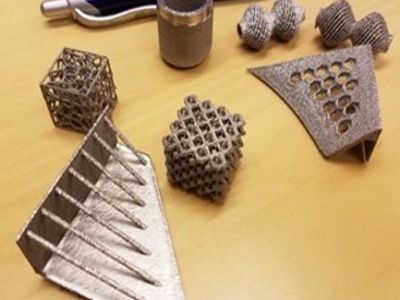This is an interdisciplinary course that covers fields relevant to additive manufacturing. The course content includes: the manufacturing techniques such as SLM (selective laser melting), EBM (electron beam melting) and DED (directed energy deposition); material and material design for additive manufacturing; mechanical properties of additively manufactured components; component design; and sustainability aspects including LCAs and circular economy. The course is given through 15 lectures and an own work in the form of a shorter project task in groups with compulsory project work presentation for all participants of the course.
FMG3920 Additive processes, materials and design for metallic components 7.5 credits

Additive manufacturing is a disruptive technology that can revolutionise how we make certain metal components. In this course, you will learn about how different metal additive manufacturing processes work, including the selection of components, design, the manufacturing process itself and post-processing. You will also learn when additive manufacturing is useful, how it affects metals, which metal feedstock is approppriate to use, what kind of properties you should expect after the process, and how you should design a metal part to take advantage of the capabalities of additive manufacturing.
You will attend lectures from expert teachers at KTH in aspects of additive manufacturing that cover the whole production process. You will also perform a computer exercise that demonstrates the process of "topological optimisation". Finally, you will perform a project, after which you must submit a written report and deliver an oral presentation, both of which will be assessed by the course examiners.
Information per course offering
Course offerings are missing for current or upcoming semesters.
Course syllabus as PDF
Please note: all information from the Course syllabus is available on this page in an accessible format.
Course syllabus FMG3920 (Autumn 2020–)Content and learning outcomes
Course contents
Intended learning outcomes
The major aim with the course is to give doctoral students in industrial production, material science, machine design and solid mechanics an interdisciplinary understanding of additive production with a focus on metallic materials. Different perspectives will be presented based on different disciplines of teachers and researchers from departments at the school for industrial technology and management (ITM)/KTH Royal Institute of Technology and the unit for Solid Mechanics at the Department of engineering mechanics, the school for technological sciences (SCI)/KTH Royal Institute of Technology.
The course also intends to increase the interaction between doctoral students with a focus on additive manufacturing in different disciplines to strengthen the connections between the different departments and contribute to the interdisciplinary research in KTH Royal Institute of Technology.
On completion of the course, the student should be able to:
- summarise and explain the different additive manufacturing processes and describe limitations and possibilities with state-of-the-art 3D printers.
- give examples of process-structure-property relations for metallic materials produced using additive manufacturing.
- apply knowledge to anticipate mechanical properties on macro level.
- apply design criteria for components produced with additive manufacturing processes including cost aspects and sustainability.
- summarise questions relevant to additive manufacturing in different disciplines in addition to the student's own subject area.
Literature and preparations
Specific prerequisites
Admitted to third-cycle programmes.
Literature
Examination and completion
Grading scale
Examination
- DEL1 - Participation, 7.5 credits, grading scale: P, F
Based on recommendation from KTH’s coordinator for disabilities, the examiner will decide how to adapt an examination for students with documented disability.
The examiner may apply another examination format when re-examining individual students.
If the course is discontinued, students may request to be examined during the following two academic years.
Examiner
Ethical approach
- All members of a group are responsible for the group's work.
- In any assessment, every student shall honestly disclose any help received and sources used.
- In an oral assessment, every student shall be able to present and answer questions about the entire assignment and solution.
Further information
Course room in Canvas
Offered by
Education cycle
Supplementary information
Field of studies:
Industrial production, material science, machine design and solid mechanics.